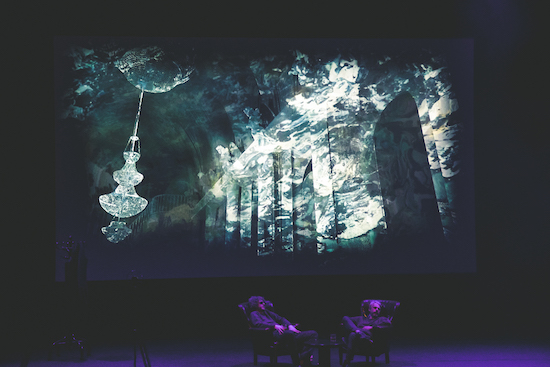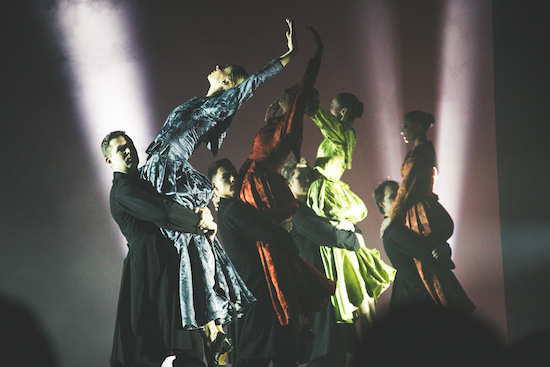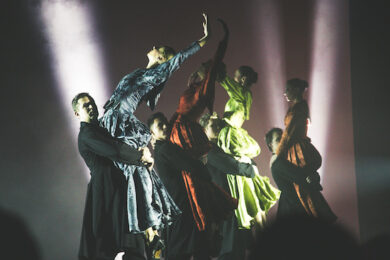photos by Tom Ham
“Take care, it’s a desert out there…: The title written on the CD case everyone is given just before The Caretaker’s performance for Unsound Dislocation at the Barbican is not quite on the mark – it’s all of 1°C outside – but it speaks nicely to the mood of reflection that pervades this not-quite-festive Friday evening. As visions of cultural identity and duality, of fractured, collapsing memories, and of stunning peripheral towns in freezing light ensnare a near-full theatre, the atmosphere is a heavy but mostly touching one. As another turbulent and universally shit year hurtles toward its end and we look anxiously toward the next, it feels worthwhile, cathartic even, to sift through the dense, weighty emotions that tonight’s three performances directly or indirectly awaken.
Curated by Unsound’s art director Mat Schulz, tonight’s three shows – Felicita and Śląsk Song & Dance Ensemble; The Caretaker; NIVHEK (Liz Harris, Grouper) – continue the thread of dislocation that themed the 2016 festival in Krakow.
London-based Felicita’s deconstructed dance music accompanies Poland’s Śląsk Song & Dance Ensemble to make Soft Power, a work that attempts to dislodge traditional Polish folk dance from its natural context by encasing it in his chaotic production. The contemporary-meets-traditional choreography of Michail Zubjov is executed rather wonderfully, as are the dynamically charged electronic beats and melodies, although the facets never seem to fully gel with one another, the narrative purpose doesn’t feel quite confident enough.
There is a surrealism to watching Leyland James Kirby (The Caretaker) and painter Ivan Seal polish off an entire bottle of whiskey during their performance. What’s weirder is how effective it is to watch the two men go from slouched silence in their armchairs to a leaning, inaudible chat about who-knows-what. Having that anchor allows the devastating visuals by Weirdcore, who dramatically alters Seal’s paintings, and the disintegrative, processed big-band music of The Caretaker to be completely absorbing without ever overpowering.
As this “overview” of The Caretaker’s ongoing Everywhere At The End Of Time album series based on dementia plays out, and the visuals place us in the corridors of a mind becoming more distorted, fractured and lost, a nostalgic sorrow grips the chest. We see a woman’s face become increasingly obscured, and colours fade and bleed into darkness while the muffled sounds invoke a more inward-looking version of Basinski’s Disintegration Loops.

The weight of this performance is amplified further by its dedication to the late theorist and writer Mark Fisher, who died in January this year. Written on the back of Take Care, It’s A Desert Out There is a message that suggests that if we find the free album to be of value, we should consider making a donation to Mind or another mental health charity in Fisher’s name. That gesture from Kirby makes it all the more touching to watch him stand and mime a haunted karaoke of the bittersweet 1930s music he works with. As he and Seal shuffle off the stage, they leave an audience in tatters, left to consider the complexity and weight that the mind can only try its best to carry.
After such a mournful performance, the spacious and ethereal sounds produced by Liz Harris under her NIVHEK moniker are purifying. In After Its Own Death, an audiovisual project conceived during a residency in the Russian Arctic city of Murmansk, Harris uses vocal layering, dissonant drones and soundscapes to create a hypnotic accompaniment to visuals by Berlin-based artist MFO (Marcel Weber). MFO’s shots of Murmansk and the village of Teriberka are slow and ghostly, showing industry, empty streets, and individuals with cold, disarming clarity.
It’s a dreamlike and meditative final hour, taking us to a place outside of our peripheral vision and frame of reference. There is a sort of peace to be felt from that, a sense of place and openness that is welcome after the intensity of The Caretaker.
Leaving the venue, we’re a bit rattled by the three works shown tonight. Then as the cold settles in and the decluttering of 12 months of turbulence commences, Unsound feels like the shake-up we need to boot us into whatever comes next.



